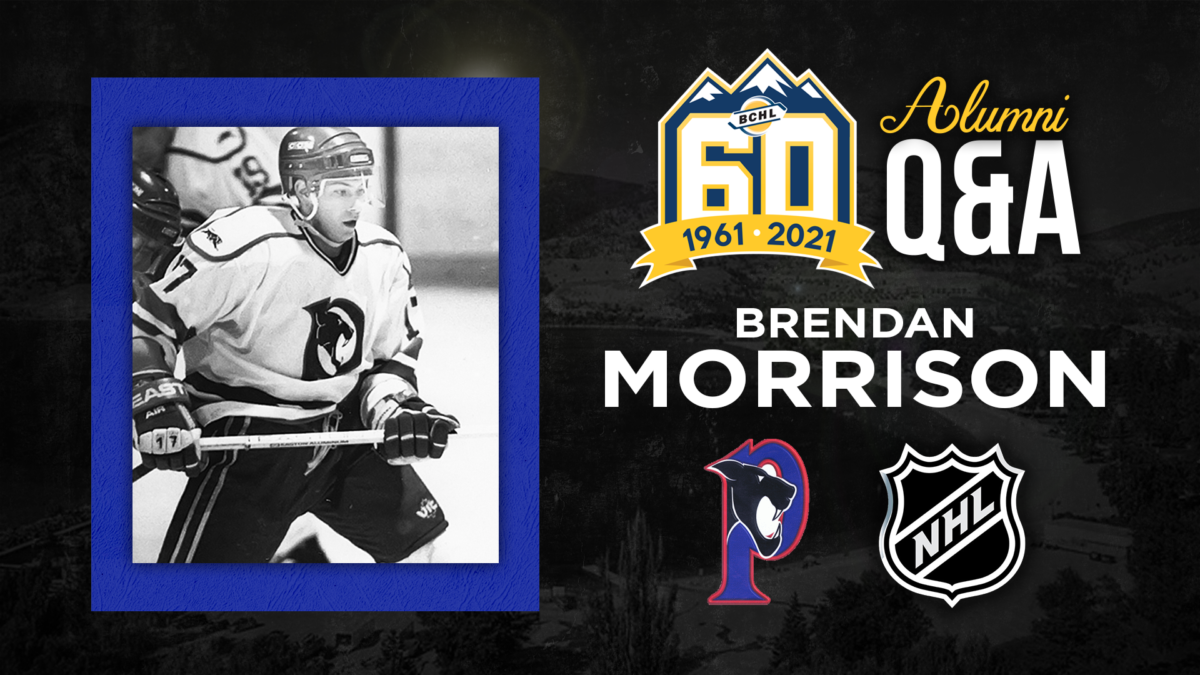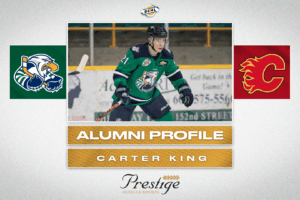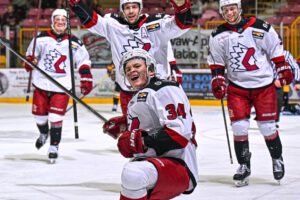Throughout the final month of the regular season and into the playoffs, we will be sharing Q&As with notable alumni as part of our continued 60th Anniversary celebration.
Today, we chat with longtime NHLer Brendan Morrison who played one season with the Penticton Panthers in 1992-93. Morrison, a Pitt Meadows, B.C. native, was drafted in the second round by the New Jersey Devils after his lone BCHL season. He played four years at the University of Michigan and scored the national championship game-winning goal in overtime in 1996.
He spent 15 seasons in the NHL, most notably his eight-plus years with his hometown Vancouver Canucks where he formed one of hockey’s best lines along with Markus Naslund and Todd Bertuzzi.
He retired from hockey in 2012.
+++
BCHL: What do you remember about your time spent in the BCHL with Penticton?
Morrison: It seems like a long time ago. We’re creeping up to 30 years. I remember it being an interesting time in a young hockey player’s career. It was the first time I was away from home, living with a billet family, going to a new school, so there are a lot of unknowns as far as how things will work out. I really liked the program in Penticton and believed in what [Panthers head coach] Garry Davidson was doing. He had some players that had come to the program before I got there and moved on to the NCAA ranks, which is a route that I wanted to pursue. He had a track record of moving guys on and that was something that I found very attractive.
BCHL: What was it about the college route that seemed like the best fit for you and your career?
Morrison: The biggest thing for me was wanting to go to school and get an education. I always had it in the back of my mind that, if hockey didn’t work out, a college degree was a nice thing to have in your back pocket. Another reason was that I liked the college game. I felt it would allow me to mature a little bit. When I played in Penticton as a 17-year-old, I wasn’t a huge player. I was probably 150 to 155 pounds. I needed to mature a little bit and I felt going the college route would allow me to do that and give me some time.
BCHL: What was the league like back when you were playing?
Morrison: It’s known as an offensive league today and I think it still had that feel and style to it. If you think back to the early ‘90s, a lot of the rinks we played in in the Interior Division had tiny arenas. We played in the old Memorial Arena in Penticton, which is a small rink. We played in a tiny rink in Kelowna. We played in a small rink in Vernon. Although it was offensive hockey, it was very physical. Playing in those tiny rinks, there’s not a lot of room in the corners. You learned to make decisions quickly in those small arenas.
BCHL: After your time in the BCHL, you played four years at the University of Michigan and scored the national championship game-winning goal in your junior year. What do you remember about that moment?
Morrison: We’re going into overtime and I just had a good feeling. You always think about these scenarios in your head when you’re a kid and scoring a big goal. I intercepted a breakout pass around the boards and I knew Bill Muckalt was in the slot, so I kind of made a blind pass to him. I spun and passed it since I knew he was going to be there and I went to the net. It’s funny, even today, I can remember it like it was just yesterday. Everything just kind of went into slow motion. I beat my man off the wall to the net. Ryan Bach, the Colorado College goaltender went down and made a save and the rebound came right to me. I pretty much had a wide-open net and I just wanted to make sure I got the puck up. I got it up and it was kind of going end over end. I circled the net and I could see the bench and my teammates with their hands in the air. It’s kind of a surreal moment, you’re thinking did this really happen? All the hard work that went into building that program, the players that played before, as well as my teammate, it was a victory that was celebrated by a lot of different people.
It was a really special time for the hockey program at the University of Michigan. They had kind of been knocking on the door for about four to six years, but couldn’t get over the hump. Out of my four years, that might have been the least talented team I played on while I was there, but we came together at the right time. We went on a heater at the end of the year and it culminated with the national championship.
BCHL: Once you hit the NHL, you played three seasons with the Devils and then were traded to your hometown Vancouver Canucks at the deadline in 2000. You ended up playing alongside Markus Naslund and Todd Bertuzzi to form the West Coast Express line, which is known as one of, if not the best line in team history. Why did the combination between the three of you work so well?
Morrison: We had a phenomenal time playing together and had a lot of good years there. It was fun. Andrew Cassels was centering those guys when I got there. My first year, I mostly played with Matt Cooke and Peter Schaefer. We had a pretty good year together, but about halfway through the next season, we had a bit of a lull there and we walked into Joe Louis Arena [in Detroit] one day for a pre-game skate and I looked at the lineup on the board and saw my name was between Bert and Nazzy and I kind of did a double take.
I knew it was a great opportunity for me. I was excited for it. I wanted to play with those guys. I learned a lot from watching Cassels play with them. We played together that night and had a couple goals that game, then they kept us together the next game and I think we had three that night. We just kind of hit it off right away. Each one of us brought something different to the line and I think that’s why we were successful. We wanted to succeed and push each other. We were hard on each other. We demanded a lot. Markus was a pure goal-scorer, but his passing was very underrated. Bert was the best power forward in the game at the time. He could finish. He could create plays. He could make room. With my playmaking ability, I could create and challenge guys with my speed, but I also brought a bit of a defensive consciousness to that line.
BCHL: You’ve been retired since 2012. What’s your level of involvement in the game of hockey these days?
Morrison: I’m pretty in tune with it. My kids are involved. My son is a freshman now at the University of Wisconsin, so I was involved coaching him quite a bit growing up. I have three daughters and my youngest daughter plays hockey. Up until this season, I coached her every year. I still like to help out as much as I can. I watch hockey and still talk to people in the game. It’s been a huge part of my life, so you just can’t walk away from it. I did have some opportunities right when I finished to get back in the game, but I just felt like I owed it to my family to be around and not travel as much. I do follow it closely still and enjoy watching it.
BCHL: When you think back on your time in the BCHL, what does it mean to you?
Morrison: For me, it was a huge springboard for my hockey career. Going in there as a 17-year-old kid and playing in that league allowed me to get a lot of exposure. It allowed me to start to grow up as a young adult, living away from home. You’re surrounded by good teammates, good people, a good leadership group and a good coaching staff. I look back on my time there very fondly. I loved everything about it. I’m proud to have played in Penticton in the BCHL. It puts a smile on my face when I think about that year.
+++
For the full interview with Brendan Morrison, tune into the latest episode of the BCHL Podcast.
https://soundcloud.com/bchlmedia/bchl-podcast-march-11th-2022-fred-harbinson-brendan-morrison














































